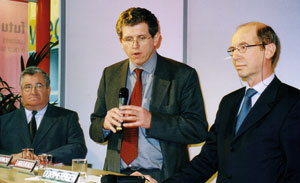
This issue in pdf Archive: Next issue: Next Special theme: |
|
|||
Close Cooperation among Researchers strengthens the Role of Europe in ITby Michael Krapp A 'Future Talk' roundtable at the CeBIT fair in Hannover brought together the Directors of the ERCIM Institutes CWI, INRIA and the chairman of the Fraunhofer ICT Group to discuss about ERCIM and the European Research Area. "The close cooperation among European research institutions is an important advantage compared to the US; Consortia like ERCIM can help to bunch competencies while the leading universities in the US compete one against the other.", said ERCIM manager and INRIA's President Bernard Larrouturou at the computer fair CeBIT in Hannover. In a forum tagged 'Future Talk' and arranged by research institutions along with the German Federal Ministry of Education and Research and the Deutsche Messe AG, Larrouturou took part in a discussion with ERCIM's president Gerard van Oortmerssen and José Luis Encarnação. Encarnação who runs the new Fraunhofer ICT Group in Germany together with his deputy and member of the ERCIM board of directors, Ulrich Trottenberg.
Encarnação pointed out that ERCIM could play an important part in the setting up of research consortia. Aiming to bring together the best European researchers in any given field, Encarnação suggested that therefore road maps have to be developed for the advancement of key fields of research in IT. Van Oortmerssen noted that ERCIM has already been organising workshops on behalf of the European Commission and will extend its efforts in providing a leading platform for research cooperation in Europe. Another topic of discussion involved how to increase young people's interest in studying mathematics and computer science. Van Oortmerssen believes it is necessary to improve the image of computer science and mathematics as disciplines of study. He hopes that the ERCIM fellowship programme will succeed in encouraging young people to study these sciences. Larrouturou's concern is that Europe should put more emphasis in attracting students from other parts of the world. Encarnação reported that in Germany the number of students in information technology is on an upward trend, mostly because of the still excellent career prospects. The three research managers also discussed the governmental funding of research. All were of the opinion that efforts to translate research results into benefits for the economy must be increased. They also talked about the question of how much basic research will be necessary in information technology. Encarnação described two approaches of doing basic research. One way is to carry out long-term research and look for markets by the time promising results are available. The other way is to look for problems in the economy and to then find solutions through research. It was also recognized that support for start-up companies is a common goal of research institutions in France, the Netherlands and Germany. Although the time of the gold digger in information technology is over Encarnação, Larrouturou and van Oortmerssen see excellent chances for business with the development of exciting ideas. |
|||


